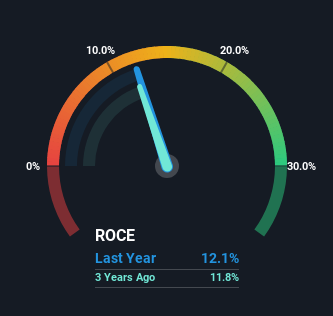- United States
- /
- Chemicals
- /
- NYSE:OEC
Orion (NYSE:OEC) Might Be Having Difficulty Using Its Capital Effectively
If we want to find a stock that could multiply over the long term, what are the underlying trends we should look for? Firstly, we'll want to see a proven return on capital employed (ROCE) that is increasing, and secondly, an expanding base of capital employed. Ultimately, this demonstrates that it's a business that is reinvesting profits at increasing rates of return. Although, when we looked at Orion (NYSE:OEC), it didn't seem to tick all of these boxes.
What Is Return On Capital Employed (ROCE)?
For those that aren't sure what ROCE is, it measures the amount of pre-tax profits a company can generate from the capital employed in its business. Analysts use this formula to calculate it for Orion:
Return on Capital Employed = Earnings Before Interest and Tax (EBIT) ÷ (Total Assets - Current Liabilities)
0.12 = US$172m ÷ (US$1.9b - US$489m) (Based on the trailing twelve months to June 2024).
Therefore, Orion has an ROCE of 12%. In absolute terms, that's a satisfactory return, but compared to the Chemicals industry average of 8.7% it's much better.
See our latest analysis for Orion

In the above chart we have measured Orion's prior ROCE against its prior performance, but the future is arguably more important. If you're interested, you can view the analysts predictions in our free analyst report for Orion .
What Can We Tell From Orion's ROCE Trend?
In terms of Orion's historical ROCE movements, the trend isn't fantastic. Around five years ago the returns on capital were 16%, but since then they've fallen to 12%. Meanwhile, the business is utilizing more capital but this hasn't moved the needle much in terms of sales in the past 12 months, so this could reflect longer term investments. It's worth keeping an eye on the company's earnings from here on to see if these investments do end up contributing to the bottom line.
What We Can Learn From Orion's ROCE
Bringing it all together, while we're somewhat encouraged by Orion's reinvestment in its own business, we're aware that returns are shrinking. Unsurprisingly then, the total return to shareholders over the last five years has been flat. Therefore based on the analysis done in this article, we don't think Orion has the makings of a multi-bagger.
On a separate note, we've found 2 warning signs for Orion you'll probably want to know about.
If you want to search for solid companies with great earnings, check out this free list of companies with good balance sheets and impressive returns on equity.
New: AI Stock Screener & Alerts
Our new AI Stock Screener scans the market every day to uncover opportunities.
• Dividend Powerhouses (3%+ Yield)
• Undervalued Small Caps with Insider Buying
• High growth Tech and AI Companies
Or build your own from over 50 metrics.
Have feedback on this article? Concerned about the content? Get in touch with us directly. Alternatively, email editorial-team (at) simplywallst.com.
This article by Simply Wall St is general in nature. We provide commentary based on historical data and analyst forecasts only using an unbiased methodology and our articles are not intended to be financial advice. It does not constitute a recommendation to buy or sell any stock, and does not take account of your objectives, or your financial situation. We aim to bring you long-term focused analysis driven by fundamental data. Note that our analysis may not factor in the latest price-sensitive company announcements or qualitative material. Simply Wall St has no position in any stocks mentioned.
About NYSE:OEC
Undervalued with moderate growth potential.
Similar Companies
Market Insights
Community Narratives



